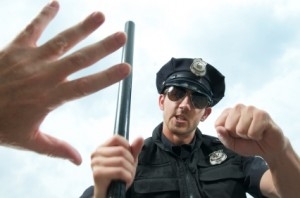Time To Get Litigious: Middle Finger Arrest Leads To Manhattan Lawsuit
Whatever happened to cool cops? You know, the kind who you could shoot the breeze with or just call “pig” without having to worry about getting a nightstick to the head? It seems like they’re rarer than a three dollar bill these days. But hey, at least now you don’t have to worry about police brutality for your childish antics – only getting arrested. Thankfully though, even if you do end up in cuffs, you can always sue the heck out of them for violating your First Amendment rights.
That’s exactly what Robert Bell did. The 26-year-old New Jersey man flipped three cops the bird after leaving a pub last August in Manhattan. The officers’ backs were turned so they didn’t see it, but a fourth officer did. And in a show of a complete lack of humor, the cop arrested Bell for disorderly conduct for making an “obscene gesture” and causing “public alarm and annoyance.”
 Bell pled not guilty. Fortunately for him, the charges were eventually dismissed when the reporting officer didn’t show for Bell’s trial. Unfortunately for the city, Bell wasn’t ready to let bygones be bygones. Instead, he filed a lawsuit against the city earlier this month. And based on the allegations in his lawsuit, Bell might actually have a good chance to win.
Bell pled not guilty. Fortunately for him, the charges were eventually dismissed when the reporting officer didn’t show for Bell’s trial. Unfortunately for the city, Bell wasn’t ready to let bygones be bygones. Instead, he filed a lawsuit against the city earlier this month. And based on the allegations in his lawsuit, Bell might actually have a good chance to win.
Civil lawsuits for police misconduct are notoriously difficult to win, especially when the basis for them lie in constitutional right violations. But winning one can mean big damages for the plaintiff, and Bell’s case is no different.
Plaintiffs who allege such fundamental harm are allowed to sue the government under section 1983 of Title 42 of the United States Code. To win under the statute, the plaintiff basically has to prove that the person who caused their harm was a government actor and that the plaintiff constitutional rights were actually violated.
The first element is usually easy to prove. After all, a government actor is anyone who works for the government. In Bell’s case, the person who arrested him was a cop. And no one is more intertwined with the government that an officer of the law.
The second element is the trickier part. Alleging a constitutional right violation requires pointing to a specific enumerated right and proving that the government actor’s actions actually violated it. But if Bell’s allegations are true, he won’t have much trouble on this front either.
Generally when it comes to police misconduct, the usual go-to allegations are unlawful arrest and malicious prosecution. The reason Bell’s case seems to be in his favor is because arguably he’s already proven both of these violations when his disorderly conduct charges were dismissed last year. In case you didn’t know already, being unlawfully arrested violates a person’s Fourth Amendment right against unlawful searches and seizure.
Furthermore, because he was arrested for flashing his middle finger at cops, his First Amendment rights were also harmed as well. And last time the Supreme Court checked, actions like his were considered to be well within one’s constitutional rights.
So what kind of damages could Bell be expecting? The full gamut, under section 1983 he could potentially get compensatory, aggravated, and exemplary damages. All of this translates to a good chunk of money from Manhattan’s budget. All because one cop couldn’t deal with the fact that people aren’t all that crazy about the police.
But what you guys think, is this a fair way to deal with allegedly misbehaving cops? As always, sound off with your thoughts in the comments section below.


Comments